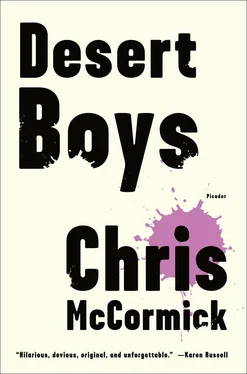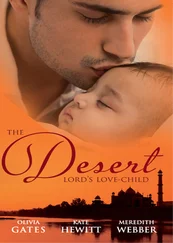“Maybe I should come,” she said. “You did promise you’d spend the whole weekend with me. Plus, I know a thing or two about immigration.”
“I don’t think it’s a forum,” I said.
“A what?”
“Like, I don’t think we’re going to talk. I think we’re marching.”
“That’s the first mistake. Nobody talks anymore.”
“I thought you were upset that nobody gets out of the car anymore. At least we’re doing that. And anyway, the march is supposed to spark a conversation. I think the conversation that follows the march is the point.”
“So I can’t come?”
Now she was cutting filo dough into little triangles, hands white with flour. I wanted to say that her kind of immigration — from Soviet Armenia through New York and Los Angeles, thirty years ago — was different from this kind, across the border with Mexico. This kind was more deeply entwined in contexts of racism, for one thing. Plus, I wanted to say, we had a two-party political system that, encountered with a phrase like “the largest growing demographic,” preferred to accomplish nothing, knowing that actual solutions would only hamper xenophobia and large anonymous political donations. In fact, I wanted to say to my mother, talk was the problem. All anyone did was talk.
Then I remembered I’d entirely made up immigration reform as the cause for the rally. As far as I knew, people were marching for creationism in the classroom.
I asked if the Band-Aid felt okay.
“You think your mother is weak,” she said. “But I’ve survived more than a cut.”
“I’m sure you have,” I sighed. I grabbed her keys from the nearby rack and jingled them to let her know I was borrowing the car. “I’ll be back before you’re done with the boreg ,” I said on the way out. “So this isn’t me breaking my promise.”
* * *
Now, at least, the traffic was no mystery. Thousands lined the sidewalks and spilled out onto the Boulevard, a recently renovated stretch of small businesses and venues in the heart of town. Mostly those rallying were white men and women, and many wore camouflage in one form or another, which quickly snuffed out any hope I had that the event would save the environment. Some people carried seated children around their necks like airplane pillows. Invariably the children waved miniature American flags, and most of their parents carried homemade signs declaring their right to free assembly, signs I found eerie in their redundancy. I pulled off on a side street and had to drive a few blocks before finding a parking space. Then I trekked back to the Boulevard and joined the flow of the crowd.
Although I’d lied about my boss at the Tribune sending me to the rally, I did bring a notepad, and more or less pretended to be a reporter. I asked some of the protesters why, exactly, they were out today. Every response was a variation on some vague patriot-babble: “Because I’m an American, and that’s what we Americans do,” or, “I just want to be out here to show support.” When I followed up by asking what it was, specifically, they were supporting, my interviewees responded with some version of, “I’m supporting freedom and democracy,” and the question returned to why that support was necessary today, and I found myself in an endless feedback loop of nationalistic vapidity. I kept checking the homemade signs, hoping to find a clear cause, but the signs were just as nebulous as the people who’d made them.
My last attempt to understand the event came when I approached a middle-aged white man pointing a handheld, battery-operated fan at his face. I said, “What do you think is at stake today for your town?”
“I hate to break it to you,” he said, “but this ain’t a town.” He threw his arms out, enveloping the Antelope Valley as thoroughly as the San Gabriel and Tehachapi Mountains, and in so doing dropped his fan. Bending to pick it up, he said, “Look around. This is a city now.”
“Well,” I started, but decided not to press the point. How do you explain what makes a city? Not the number of people or the sluggishness of traffic, but what? What I’d had in mind was something like my daily commute to the office at Lake Merritt, where I would stand in the aisle of the crowded 88 bus and listen to secrets traded and affirmed in the boundless languages of the world, where I’d hold on to the chrome bars so tightly that when my stop finally came, my hands smelled strikingly and perfectly of blood. A city got its smell on you, the smell of life itself, and no matter how inflated its population had grown, the Antelope Valley was no city.
I thanked the man and went on my way. The day was hot and dry as usual, but a thin cloud cover kept everyone marching in relative comfort. Along the grass meridian bisecting the Boulevard, beach umbrellas and foldout tables had been set up, and opportunistic capitalists were selling bottled water and snacks. Although I was enjoying the reporter character I’d invented for myself, I suddenly began to feel sick. I’d always imagined that I was born in the wrong place, that I was a metropolitan kid playacting the small-town boy. But now the truth set in: I was a small-town kid pretending to be a big-city reporter, and the inversion of my mask, along with the heat, had me dizzy. I went to buy a bottle of water.
At one of the umbrella-covered kiosks, I found a stack of flyers for the day’s event, held down against the wind by a rock. DON’T BELIEVE PHONY POLL NUMBERS, said the headline, beneath which came a few hundred words debunking the media’s declaration of the war’s growing unpopularity. The protest was a general assembly of the new, so-called American Popularity Party. Just as I was beginning to understand the day’s event, I spotted Roxanne Karinger. Although she looked not unlike a hundred other girls at the rally — blond, self-tanned, and pretty — I knew it was Roxanne. She stood the same way Karinger did, perfect posture except for the toes pointed inward. If she’d been alone, I might’ve gone to her and started the long work of mending my friendship with her brother. But she was with her mother, a woman who had been, until the fight, something of a second mom to me, not that I needed one, and suddenly I felt so absolutely silly for carrying a notepad and a pen that I dropped them where I stood and walked back to the car, ignoring the voice yelling after me, “Sir! Hey! You’re littering! You can’t just litter!”
* * *
Again we were in the car, but this time I was behind the wheel. Half past seven and the sun was still up. Dinner started thirty minutes ago, but the traffic and the daylight made it impossible for me to feel rushed. My mom didn’t seem to share the sentiment. She bounced in the passenger seat, rattling the lid of the porcelain dish in her lap, telling me to cut the line.
“There’s nowhere to go,” I said.
“Well, if you hadn’t gone to that rally, we would’ve left on time.”
That I’d returned from the Boulevard hours earlier, that I’d spent the entire afternoon listening to her assessment of my sister’s chances of finding a husband in law school, didn’t seem to matter. I had left her, briefly, and now our whole weekend was thrown.
“What time is your flight tomorrow to San Francisco?”
She always treated Berkeley and Oakland as neighborhoods in San Francisco, and I’d stopped correcting her a long time ago.
“Not until noon,” I said. “But I should get there by ten, so, leave here at nine?”
“Why did you make it so early? Couldn’t you have spent the day here, one more day?”
“I just bought the cheapest flight,” I said.
“Twenty dollars cheaper,” she scoffed, almost to herself. “It’s not the money, and you know it. Don’t lie to me. You just don’t want to be here with us. You’d rather be in San Francisco.”
Читать дальше












